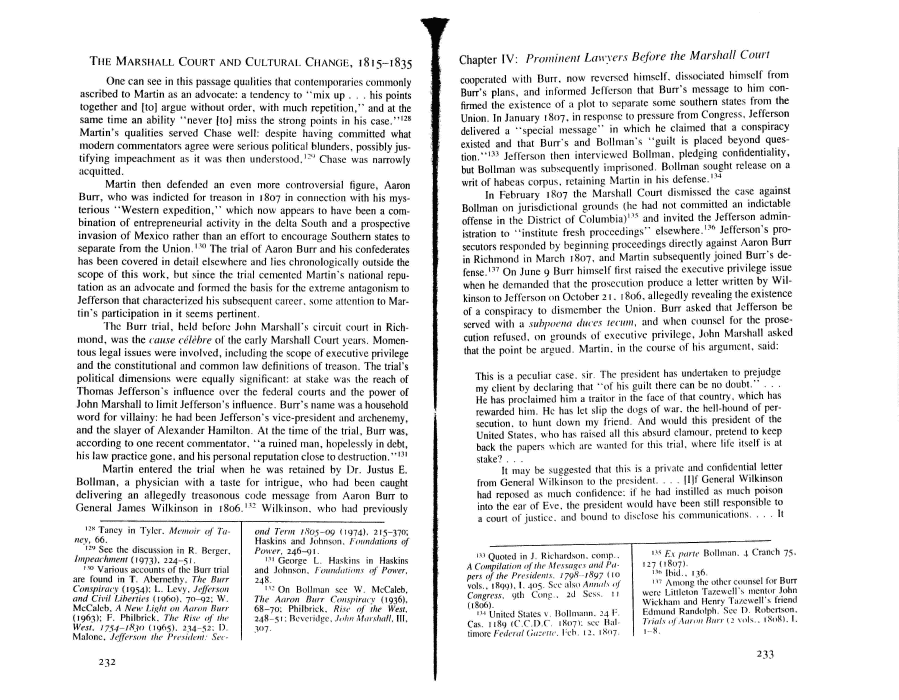|
THE MARSHALL COURT AND CULTURAL CHANGE, 1815-1835 I Chapter IV: Prominent Lawyers Before the Marshall Court
One can see in this passage qualities that contemporaries commonly
ascribed to Martin as an advocate: a tendency to "mix up ... his points
together and [to] argue without order, with much repetition," and at the
same time an ability "never [to] miss the strong points in his case."128
Martin's qualities served Chase well: despite having committed what
modern commentators agree were serious political blunders, possibly jus-
tifying impeachment as it was then understood,12'' Chase was narrowly
acquitted.
Martin then defended an even more controversial figure, Aaron
Burr, who was indicted for treason in 1807 in connection with his mys-
terious "Western expedition," which now appears to have been a com-
bination of entrepreneurial activity in the delta South and a prospective
invasion of Mexico rather than an effort to encourage Southern states to
separate from the Union.130 The trial of Aaron Burr and his confederates
has been covered in detail elsewhere and lies chronologically outside the
scope of this work, but since the trial cemented Martin's national repu-
tation as an advocate and formed the basis for the extreme antagonism to
Jefferson that characterized his subsequent career, some attention to Mar-
tin's participation in it seems pertinent.
The Burr trial, held before John Marshall's circuit court in Rich-
mond, was the cause celebre of the early Marshall Court years. Momen-
tous legal issues were involved, including the scope of executive privilege
and the constitutional and common law definitions of treason. The trial's
political dimensions were equally significant: at stake was the reach of
Thomas Jefferson's influence over the federal courts and the power of
John Marshall to limit Jefferson's influence. Burr's name was a household
word for villainy: he had been Jefferson's vice-president and archenemy,
and the slayer of Alexander Hamilton. At the time of the trial, Burr was,
according to one recent commentator, "a ruined man, hopelessly in debt,
his law practice gone, and his personal reputation close to destruction."131
Martin entered the trial when he was retained by Dr. Justus E.
Bollman, a physician with a taste for intrigue, who had been caught
delivering an allegedly treasonous code message from Aaron Burr to
General James Wilkinson in i8o6.132 Wilkinson, who had previously
I2X Tancy in Tylcr. Memoir of Ta-
ncy, 66.
129 See the discussion in R. Berger,
Impeachment (1973), 224-51.
M0 Various accounts of the Burr trial
are found in T. Abernethy. The Burr
Conspiracy (1954); L. Levy, Jefferson
and Civil Liberties (1960), 70-92; W.
McCaleb, A New Light on Aaron Burr
(1963); F. Philbrick. The Rise of the
West, 1754-1830 (1965), 234-52; I).
Malonc, Jefferson the President: Sec-
232
and Term 1805-09 (1974). 215-370;
Haskins and Johnson. Foundations of
Power, 246-91.
I?l George L. Haskins in Haskins
and Johnson, Foundations of Power,
248.
"- On Bollman see W. McCaleb,
The Aaron Burr Conspiracv (1936),
68-70; Philbrick, Rise of 'the West,
248-51; Bevcridgc, John Marshall, III,
307. "
cooperated with Burr, now reversed himself, dissociated himself from
Burr's plans, and informed Jefferson that Burr's message to him con-
firmed the existence of a plot to separate some southern states from the
Union. In January 1807, in response to pressure from Congress, Jefferson
delivered a "special message" in which he claimed that a conspiracy
existed and that Burr's and Bollman's "guilt is placed beyond ques-
tion."133 Jefferson then interviewed Bollman, pledging confidentiality,
but Bollman was subsequently imprisoned. Bollman sought release on a
writ of habeas corpus, retaining Martin in his defense.134
In February 1807 the Marshall Court dismissed the case against
Bollman on jurisdictional grounds (he had not committed an indictable
offense in the District of Columbia)135 and invited the Jefferson admin-
istration to "institute fresh proceedings" elsewhere.136 Jefferson's pro-
secutors responded by beginning proceedings directly against Aaron Burr
in Richmond in March 1807, and Martin subsequently joined Burr's de-
fense.137 On June 9 Burr himself first raised the executive privilege issue
when he demanded that the prosecution produce a letter written by Wil-
kinson to Jefferson on October 21,1806, allegedly revealing the existence
of a conspiracy to dismember the Union. Burr asked that Jefferson be
served with a subpoena dnccs lectim, and when counsel for the prose-
cution refused, on grounds of executive privilege, John Marshall asked
that the point be argued. Martin, in the course of his argument, said:
This is a peculiar case, sir. The president has undertaken to prejudge
my client by declaring that "of his guilt there can be no doubt." . . .
He has proclaimed him a traitor in the face of that country, which has
rewarded him. He has let slip the dogs of war. the hell-hound of per-
secution, to hunt down my friend. And would this president of the
United States, who has raised all this absurd clamour, pretend to keep
back the papers which are wanted for this trial, where life itself is at
stake? . . .
It may be suggested that this is a private and confidential letter
from General Wilkinson to the president. . . . [I]f General Wilkinson
had reposed as much confidence: if he had instilled as much poison
into the ear of Eve, the president would have been still responsible to
a court of justice, and bound to disclose his communications. ... It
m Quoted in J. Richardson, comp..
A Compilation of the Messages and Pa-
pers of the Preside/us, 170,8--1897 (10
vols., 1899), I. 405. See also Annals of
Congress, 9th Cone., 2d Sess. n
(1806).
114 United States v. Bollmann. 24 F.
Cas. 1189 (C.C.D.C. 1807): see Hal-
timorc Federal Gazelle. Feb. 12, 1807.
'•vs E\ pane Bollman. 4 Cranch 75,
127 (1807).
'"• Ibid., 136.
117 Among the other counsel for Bun-
were Littleton Tazewell's mentor John
Wickham and Henry Ta/ewell's friend
Edmund Randolph. See D. Robcrtson.
Trials of Aaron Hun (2 vols.. 1X08). I.
1-8.
|

